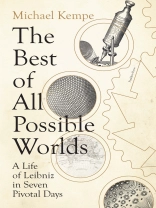Gottfried Wilhelm Leibniz was one of history’s most astounding thinkers, a universal genius akin to Leonardo da Vinci or Benjamin Franklin, but comparatively little known. In this mind-expanding biography, historian Michael Kempe charts a thrilling course through Leibniz’s work, illuminating the continued impact of his unparalleled contributions to knowledge.Recreating seven crucial days in Leibniz’s life, Kempe shows us a great mind in action, surging with ideas that would change the course of mathematics and philosophy, even laying early foundations for modern digital culture. We find him in Paris, working from his bed amidst a sea of notes when he puts the basis for modern calculus to paper for the first time; and in Vienna, enjoying a coffee as he discovers unforeseen links between biology and mathematics.Convinced that everything was profoundly interconnected, Leibniz was driven by an exhilarating optimism that allowed him to build bridges between faith and reason, physics and metaphysics – and to harness the endless potential of a single mind on a single day.
เกี่ยวกับผู้แต่ง
Michael Kempe studied History and Philosophy in Konstanz and Dublin. He is head of the Leibniz Archives/Research Unit at the Göttingen Academy of Sciences and Humanities and Director of the Leibniz Archive in Hannover.Marshall Yarbrough is a writer, translator, and musician. He has translated works by Ulla Lenze, Norman Ohler, and Wolf Wondratschek, among other authors.












